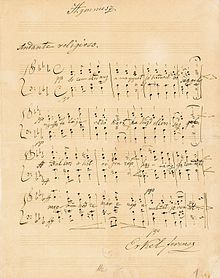Isten, áldd meg a magyart
Jó kedvvel, bőséggel,
Nyújts feléje védő kart,
Ha küzd ellenséggel;
Bal sors akit régen tép,
Hozz rá víg esztendőt,
Megbűnhődte már e nép
A múltat s jövendőt!
Őseinket felhozád
Kárpát szent bércére,
Általad nyert szép hazát
Bendegúznak vére.
S merre zúgnak habjai
Tiszának, Dunának,
Árpád hős magzatjai
Felvirágozának.
Értünk Kunság mezein
Ért kalászt lengettél,
Tokaj szőlővesszein
Nektárt csepegtettél.
Zászlónk gyakran plántálád
Vad török sáncára,
S nyögte Mátyás bús hadát
Bécsnek büszke vára.
Hajh, de bűneink miatt
Gyúlt harag kebledben,
S elsújtád villámidat
Dörgő fellegedben,
Most rabló mongol nyilát
Zúgattad felettünk,
Majd töröktől rabigát
Vállainkra vettünk.
Hányszor zengett ajkain
Ozmán vad népének
Vert hadunk csonthalmain
Győzedelmi ének!
Hányszor támadt tenfiad
Szép hazám, kebledre,
S lettél magzatod miatt
Magzatod hamvvedre!
Bújt az üldözött, s felé
Kard nyúlt barlangjában,
Szerte nézett s nem lelé
Honját a hazában,
Bércre hág és völgybe száll,
Bú s kétség mellette,
Vérözön lábainál,
S lángtenger fölette.
Vár állott, most kőhalom,
Kedv s öröm röpkedtek,
Halálhörgés, siralom
Zajlik már helyettek.
S ah, szabadság nem virúl
A holtnak véréből,
Kínzó rabság könnye hull
Árvánk hő szeméből!
Szánd meg Isten a magyart
Kit vészek hányának,
Nyújts feléje védő kart
Tengerén kínjának.
Bal sors akit régen tép,
Hozz rá víg esztendőt,
Megbűnhődte már e nép
A múltat s jövendőt!
|
[ˈɪʃ.tɛ̞n äːld mɛ̞g ɒ ˈmɒ.ɟɒrt]
[joː ˈkɛ̞d.vɛ̞l ˈbøː.ʃeːg.gɛ̞l]
[ɲuːjt͡ʃ ˈfɛ̞.leː.jɛ̞ ˈveː.døː kɒrt]
[hɒ kʏzd ˈɛ̞l.lɛ̞n.ʃeːg.gɛ̞l]
[bɒl ʃorʃ ˈɒ.kɪt ˈreː.gɛ̞n teːp]
[hozː räː viːg ˈɛ̞s.tɛ̞n.døːt]
[ˈmɛ̞g.byːn.høːt.tɛ̞ mäːr ɛ̞ neːp]
[ɒ ˈmuːl.tɒt ˈʃ‿jø̞.vɛ̞n.døːt]
[ˈøː.ʃɛ̞.ɪŋ.kɛ̞t ˈfɛ̞l.ho.zäːd]
[ˈkäːr.päːt sɛ̞nd ˈbeːr.t͡seː.rɛ̞]
[ˈäːl.tɒ.lɒd ɲɛ̞rt seːp ˈhɒ.zäːt]
[ˈbɛ̞n.dɛ̞.guːz.nɒg ˈveː.rɛ̞]
[ˈʃ‿mɛ̞r.rɛ̞ ˈzuːg.nɒk ˈhɒb.jɒ.ɪ]
[ˈtɪ.säː.nɒg ˈdʊ.näː.nɒk]
[ˈäːr.päːt høːʃ ˈmɒg.sɒc.cɒ.ɪ]
[ˈfɛ̞l.vɪ.räː.go.zäː.nɒk]
[ˈeːr.tʏŋk ˈkʏn.ʃäːg ˈmɛ̞.zɛ̞.ɪn]
[eːrt ˈkɒ.läːst ˈlɛ̞ŋ.gɛ̞t.teːl]
[ˈto.kɒj ˈsøː.løː.vɛ̞s.sɛ̞.ɪn]
[ˈnɛ̞k.täːrt ˈt͡ʃɛ̞.pɛ̞k.tɛ̞t.teːl]
[ˈzäːs.loːɲɟ ˈɟɒ.krɒm ˈpläːn.täː.läːd]
[vɒt ˈtø̞.rø̞k ˈʃäːn.t͡säː.rɒ]
[ˈʃ‿ɲø̞k.tɛ̞ ˈmäː.cäːʒ buːʃ ˈhɒ.däːt]
[ˈbeːt͡ʃ.nɛ̞g ˈbʏs.kɛ̞ ˈväː.rɒ]
[hɒjh dɛ̞ ˈbʏ.nɛ̞.ɪŋk ˈmɪ.ɒtː]
[ɟuːlt ˈhɒ.rɒk ˈkɛ̞b.lɛ̞d.bɛ̞n]
[ˈʃ‿ɛ̞l.ʃuːj.täːd ˈvɪl.läː.mɪ.dɒt]
[ˈdø̞r.gøː ˈfɛ̞l.lɛ̞.gɛ̞d.bɛ̞n]
[moʃt ˈrɒ.bloː ˈmoŋ.gol ˈɲɪ.läːt]
[ˈzuː.gɒt.tɒt ˈfɛ̞.lɛ̞t.tʏŋk]
[mɒjt ˈtø̞.rø̞k.tøːl ˈrɒ.bɪ.gäːt]
[ˈväːl.lɒ.ɪŋ.krɒ ˈvɛ̞t.tʏŋk]
[ˈhäːɲ.sor ˈzɛ̞ŋ.gɛ̞tː ˈɒj.kɒ.ɪn]
[ˈoz.mäːɱ vɒd ˈneː.peː.nɛ̞k]
[vɛ̞rt ˈhɒ.dʊŋk ˈt͡ʃont.hɒl.mɒ.ɪn]
[ˈɟøː.zɛ̞.dɛ̞l.mɪ ˈeː.nɛ̞k]
[ˈhäːɲ.sor ˈtäː.mɒtː ˈtɛ̞ɱ.fɪ.ɒd]
[seːp ˈhɒ.zäːm ˈkɛ̞b.lɛ̞d.rɛ̞]
[ˈʃ‿lɛ̞t.teːl ˈmɒg.zɒ.tod ˈmɪ.ɒtː]
[ˈmɒg.zɒ.tot ˈhɒɱv.vɛ̞d.rɛ̞]
[buːjt ɒz ˈʏl.dø̞.zø̞tː ˈʃ‿fɛ̞.leː]
[kɒrd ɲuːld ˈbɒr.lɒŋg.jäː.bɒn]
[ˈsɛ̞r.tɛ̞ ˈneː.zɛ̞tː ʃ‿nɛ̞m ˈlɛ̞.leː]
[ˈhon.jäːt ɒ ˈhɒ.zäː.bɒn]
[ˈbeːrt͡s.rɛ̞ häːg eːʒ ˈvø̞ʎɟ.bɛ̞ säːlː]
[buːʃ ˈkeː.t͡ʃeːg ˈmɛ̞l.lɛ̞t.tɛ̞]
[ˈveː.rø̞.zø̞n ˈläː.bɒ.ɪ.näːl]
[ˈʃ‿läːŋk.tɛ̞ŋ.gɛ̞r ˈfø̞.lɛ̞t.tɛ̞]
[väːr ˈäːl.lotː moʃt ˈkøː.hɒ.lom]
[kɛ̞df ˈʃ‿ø̞.rø̞m ˈrø̞p.kɛ̞t.tɛ̞k]
[ˈhɒ.läːl.hø̞r.geːʃ ˈʃɪ.rɒ.lom]
[ˈzɒj.lɪk mäːr ˈhɛ̞.jɛ̞t.tɛ̞k]
[ʃ‿ɒh ˈsɒ.bɒ.t͡ʃäːg nɛ̞ɱ ˈvɪ.ruːl]
[ɒ ˈholt.nɒg ˈveː.reː.bøːl]
[ˈkiːn.zoː ˈrɒp.ʃaːk ˈkø̞n.ɲɛ̞ huːl]
[ˈäːr.väːŋk høː ˈsɛ̞.meː.bøːl]
[saːnd mɛ̞g ˈɪʃ.tɛ̞n ɒ ˈmɒ.ɟɒrt]
[kɪd ˈveː.sɛ̞k ˈhäː.ɲäː.nɒk]
[ɲuːjt͡ʃ ˈfɛ̞.leː.jɛ̞ ˈveː.døː kɒrt]
[ˈtɛ̞ŋ.gɛ̞.reːŋ ˈkiːɲ.jäː.nɒk]
[bɒl ʃorʃ ˈɒ.kɪt ˈreː.gɛ̞n teːp]
[hozː räː viːg ˈɛ̞s.tɛ̞n.døːt]
[ˈmɛ̞g.byːn.høːt.tɛ̞ mäːr ɛ̞ neːp]
[ɒ ˈmuːl.tɒt ˈʃ‿jø.vɛ̞n.døːt]
|
O, my God, the Magyar bless
With Thy plenty and good cheer!
With Thine aid his just cause press,
Where his foes to fight appear.
Fate, who for so long did'st frown,
Bring him happy times and ways;
Atoning sorrow hath weighed down
Sins of past and future days.
By Thy help our fathers gained
Kárpát's proud and sacred height;
Here by Thee a home obtained
Heirs of Bendegúz, the knight.
Where'er Danube's waters flow
And the streams of Tisza swell
Árpád's children, Thou dost know,
Flourished and did prosper well.
For us let the golden grain
Grow upon the fields of Kún,
And let nectar's silver rain
Ripen grapes of Tokay soon.
Thou our flags hast planted o'er
Forts where once wild Turks held sway;
Proud Vienna suffered sore
From King Mátyás' dark array.
But, alas! for our misdeed,
Anger rose within Thy breast,
And Thy lightnings Thou did'st speed
From Thy thundering sky with zest.
Now the Mongol arrow flew
Over our devoted heads;
Or the Turkish yoke we knew,
Which a free-born nation dreads.
O, how often has the voice
Sounded of wild Osman's hordes,
When in songs they did rejoice
O'er our heroes' captured swords!
Yea, how often rose Thy sons,
My fair land, upon Thy sod,
And Thou gavest to these sons,
Tombs within the breast they trod!
Though in caves pursued he lie,
Even then he fears attacks.
Coming forth the land to spy,
Even a home he finds he lacks.
Mountain, vale – go where he would,
Grief and sorrow all the same –
Underneath a sea of blood,
While above a sea of flame.
'Neath the fort, a ruin now,
Joy and pleasure erst were found,
Only groans and sighs, I trow,
In its limits now abound.
But no freedom's flowers return
From the spilt blood of the dead,
And the tears of slavery burn,
Which the eyes of orphans shed.
Pity, God, the Magyar, then,
Long by waves of danger tossed;
Help him by Thy strong hand when
He on grief's sea may be lost.
Fate, who for so long did'st frown,
Bring him happy times and ways;
Atoning sorrow hath weighed down
All the sins of all his days.
|

